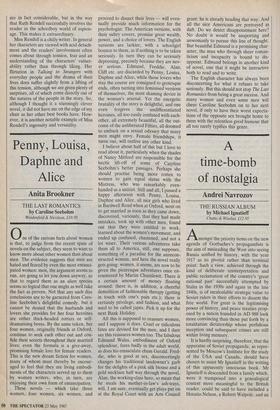A time-bomb of nostalgia
Andrei Navrozov
THE RUSSIAN ALBUM by Michael Ignatieff
Chatto &Windus, f12.95
Amongst the priority items on the new agenda of Gorbachev's propagandists is the aim of misleading the West into seeing Russia unified by history, with the year 1917 as its pivotal rather than terminal point. Such a view, achieved through the kind of deliberate reinterpretation and public reclamation of the country's 'great national past' successfully attempted by Stalin in the 1930s and again in the late 1940s, is of incalculable strategic value to Soviet rulers in their efforts to disarm the free world. For great is the legitimising power of history, and peace treaties prop- osed by a nation founded in AD 988 look more convincing than those put forth by a totalitarian dictatorship whose perfidious inception and subsequent crimes are still within living memory.
It is hardly surprising, therefore, that the apparatus of Soviet propaganda, as repre- sented by Moscow's Institute for the study of the USA and Canada, should have chosen to assist Mr Ignatieff in the writing of this apparently innocuous book. Mr Ignatieff is descended from a family which, were it transposed into a genealogical context more meaningful to the British reader, could be said to have included a Horatio Nelson, a Robert Walpole, and an Edmund Burke amongst the intellectual ornaments of an impressively noble lineage. Nor is it surprising, in the final analysis, that Mr Ignatieff has himself noticed the Soviet regime's attempt 'to recuperate the Tsarist past':
Now not just the great palaces and monaster- ies were regilded but anything with a patina of age began to reacquire authority. A new national past uniting pre- and post-1917 was constructed by artful elusion of the revolu- tion's destructive work.
What is surprising is the sheer magnitude of the miscalculation made by the Insti- tute's propagandists in the case of The Russian Album: far from helping them in the manipulation of history, Mr Ignatieff s book explodes in their faces like a time- bomb of nostalgia.
It is all here, in this slim volume of second-hand memories, a family history that is also a history of the Russian nation, a public past 'recuperated' outside ideolo- gy because it is also a private past. Had its author dug up some colourful picture postcards of his ancestors — defeating Napoleon, traversing Asia, dining with Disraeli — and stopped there, his book would have been a Soviet propaganda success. But Mr Ignatieff chose to dig deeper, laying bare before his Western readership the one side of the national past which his helpful hosts wanted most to conceal: Russia's civic evolution, which. transformed the empire in the last 50 years of its existence into a constitutional monar- chy and prepared it for a future of political freedom that would never come.
At the end of his life, Mr Ignatieff's paternal great-great-grandfather, P.M. Ignatieff, as governor of St Petersburg ordered the imprisonment of young Dos- toevsky. His great-grandfather, N. P. Ignatieff, ambassador to the Constantino- ple of Sultan Abdul Aziz on the eve of the Balkan conflagration, redrew the map of Europe at San Stefano. His grandfather, P. N. Ignatieff, was the last minister of education in the cabinet of Nicholas II, whose own grandfather, Alexander II, had stood by the baptismal font at the christen- ing of this Ignatieff's father. These men presided over the territorial and intellec- tual empire built by many of Mr Ignatieff's maternal ancestors, from Field Marshal Kutuzov of War and Peace fame to Rus- sia's great historian Nikolai Karamzin. The patient and laborious weaving of the na- tion's social fabric by generations of such men, devoted to public service and the ideals of an increasingly constitutional monarchy, was interrupted by the first world war. The world's fastest-growing economy (built up, amongst others, by another of Mr Ignatieff's ancestors, the legendary industrialist and benefactor Nechaev-Maltsev) faltered. The living tis- sue of civic evolution these men tended with care if not without mistakes which, as Clausewitz tells us, are destiny to men of action — was then torn to shreds in the
autumn of 1917 by a small band of ruthless demagogues leading an army of deserters in a military coup that would change the world for all time. The 'essentially British ideal of constitutional government', as Mr Ignatieff puts it, would never be realised. The country remained, 'starving, vermi- nous, ruined.' The rest, as they say, is history.
It is this terrible history that Mr Ignatieff has written, not, as he himself must have believed all along, a charming family chronicle. I wept as I read it, and if the tears of a young exile from the closed world once called Russia are at all like the tears shed by Mr Ignatieff's ancestors as HMS Huanchaco weighed anchor in Novorossiysk harbour to take them across the Black Sea, no better tribute to The Russian Album is perhaps necessary.
As the Huanchaco neared Constantinople and entered the Bosphorus on the last morning of the voyage, the ship was boarded by British and French intelligence agents who asked Paul where he was born. He looked out of the window and said quietly, `Constantinople.' They told him to be se- rious, and he said he was perfectly serious. There, just as he spoke, the ship passed below the gleaming white walls of the Rus- sian ambassador's summer residence high on the bluffs of Byouk Dere. Standing there in the line with the other refugees Paul could look up and point to the second-storey window where he had been born.










































































 Previous page
Previous page